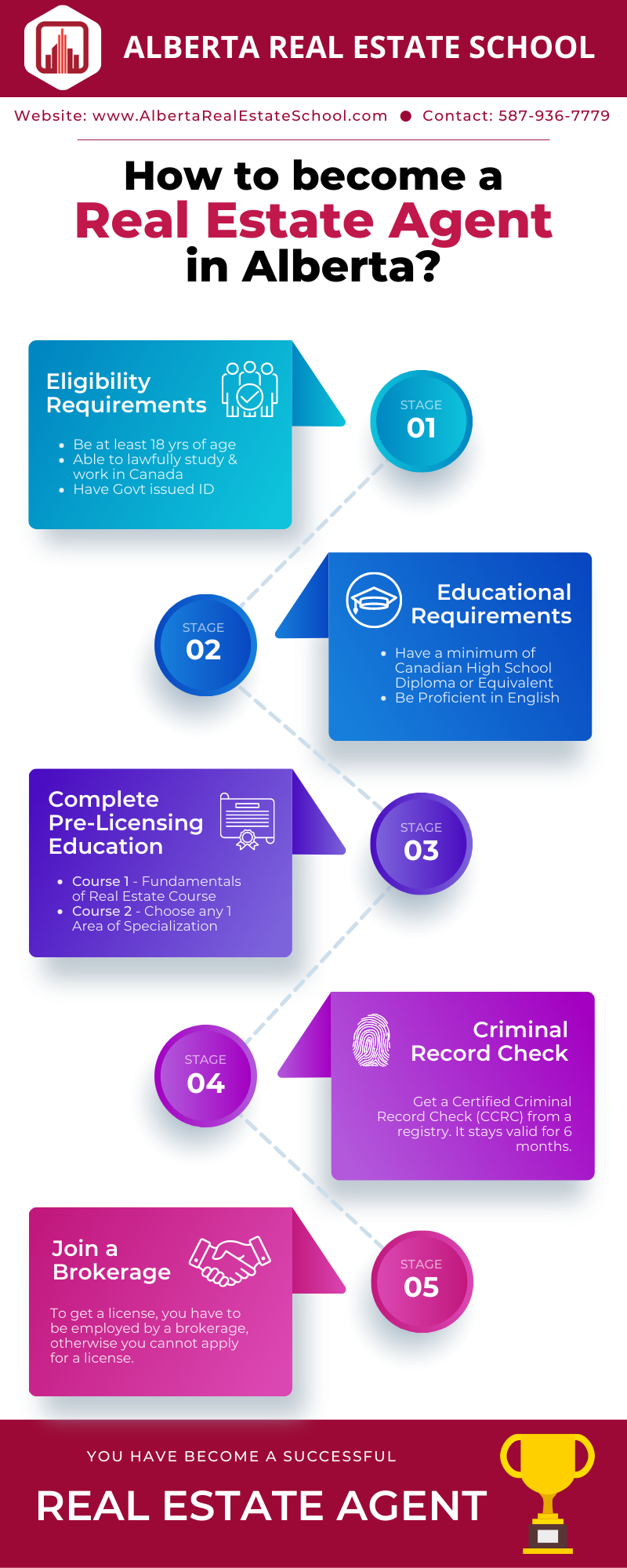
Anyone who wants to become a real-estate agent in Arkansas must have a license. Real estate agents in the state can earn high ticket commissions, making it a lucrative job. However, obtaining a license is not the easiest thing to do. There are some steps you can follow to make this process easier.
First, you have to be a lawfully authorized resident of the United States. For your real estate education to be complete, you'll need to enroll in an accredited secondary school. You can do this either in person or online. Arkansas has several schools that offer comprehensive courses in real estate.
Next is to submit an Arkansas Real Estate Commission application. Applicants must fill out all the required forms and pay the correct fees. These include fingerprints and a background check. There is also a fee to take the exam. An applicant with a criminal record may not be eligible for a license to sell real estate in the state. A background check will be done by the State Police for a small fee.

A person applying for a realty license must be at least 18 years old. The applicants must be able and willing to show that they have completed 60 hours of training before they can apply for a real estate license. They will be required to submit documentation to support their application if the applicant has a criminal history.
After passing the background check and passing the licensing examination, you can apply to get your license. Arkansas Real Estate Commission will require that applicants submit a completed fingerprintcard and $50 fee. A certificate of completion or proof that a pre-license education has been completed is required by an applicant to get a real estate licence.
Once you have successfully obtained your real estate license, you must complete 18 hours of post-licensing education within six months. Failure to meet this requirement will result in the applicant having to reapply for the exam. Licenses issued in Arkansas expire on December 31st of each year. To renew your license in Arkansas, you must pass the licensing examination again, pay $22 for recovery fund fees, and sign a postlicense.
You might need additional licensing depending upon the area in which you wish to practice. Arkansas and other States have reciprocity agreements. Arkansas generally will not accept a licence from another state that doesn't have reciprocity. To be able sell in Arkansas, your license must be renewed if you are already licensed in another country.

Getting a real estate license in Arkansas is a simple process. Whether you choose to go through the online route or take classes in person, completing your real estate education is a great way to jumpstart your new career. Your success depends on your choice of the right brokerage.
FAQ
What is the average time it takes to get a mortgage approval?
It is dependent on many factors, such as your credit score and income level. It takes approximately 30 days to get a mortgage approved.
How long does it take to sell my home?
It depends on many factors including the condition and number of homes similar to yours that are currently for sale, the overall demand in your local area for homes, the housing market conditions, the local housing market, and others. It may take up to 7 days, 90 days or more depending upon these factors.
What are the three most important factors when buying a house?
The three most important factors when buying any type of home are location, price, and size. It refers specifically to where you wish to live. Price refers how much you're willing or able to pay to purchase the property. Size is the amount of space you require.
Should I rent or buy a condominium?
Renting is a great option if you are only planning to live in your condo for a short time. Renting can help you avoid monthly maintenance fees. On the other hand, buying a condo gives you ownership rights to the unit. The space is yours to use as you please.
Is it better to buy or rent?
Renting is usually cheaper than buying a house. However, renting is usually cheaper than purchasing a home. There are many benefits to buying a home. You will have greater control of your living arrangements.
What should I consider when investing my money in real estate
You must first ensure you have enough funds to invest in property. If you don’t save enough money, you will have to borrow money at a bank. It is important to avoid getting into debt as you may not be able pay the loan back if you default.
It is also important to know how much money you can afford each month for an investment property. This amount should include mortgage payments, taxes, insurance and maintenance costs.
Also, make sure that you have a safe area to invest in property. You would be better off if you moved to another area while looking at properties.
Statistics
- When it came to buying a home in 2015, experts predicted that mortgage rates would surpass five percent, yet interest rates remained below four percent. (fortunebuilders.com)
- Over the past year, mortgage rates have hovered between 3.9 and 4.5 percent—a less significant increase. (fortunebuilders.com)
- Private mortgage insurance may be required for conventional loans when the borrower puts less than 20% down.4 FHA loans are mortgage loans issued by private lenders and backed by the federal government. (investopedia.com)
- This means that all of your housing-related expenses each month do not exceed 43% of your monthly income. (fortunebuilders.com)
- 10 years ago, homeownership was nearly 70%. (fortunebuilders.com)
External Links
How To
How to manage a rental property
While renting your home can make you extra money, there are many things that you should think about before making the decision. These tips will help you manage your rental property and show you the things to consider before renting your home.
Here are some things you should know if you're thinking of renting your house.
-
What should I consider first? Before you decide if your house should be rented out, you need to examine your finances. If you are in debt, such as mortgage or credit card payments, it may be difficult to pay another person to live in your home while on vacation. Also, you should review your budget to see if there is enough money to pay your monthly expenses (rent and utilities, insurance, etc. It might not be worth the effort.
-
What is the cost of renting my house? There are many factors that go into the calculation of how much you can charge to let your home. These include factors such as location, size, condition, and season. You should remember that prices are subject to change depending on where they live. Therefore, you won't get the same rate for every place. Rightmove has found that the average rent price for a London one-bedroom apartment is PS1,400 per mo. This means that you could earn about PS2,800 annually if you rent your entire home. Although this is quite a high income, you can probably make a lot more if you rent out a smaller portion of your home.
-
Is it worthwhile? It's always risky to try something new. But if it gives you extra income, why not? Make sure that you fully understand the terms of any contract before you sign it. It's not enough to be able to spend more time with your loved ones. You'll need to manage maintenance costs, repair and clean up the house. These are important issues to consider before you sign up.
-
Are there any advantages? You now know the costs of renting out your house and feel confident in its value. Now, think about the benefits. You have many options to rent your house: you can pay off debt, invest in vacations, save for rainy days, or simply relax from the hustle and bustle of your daily life. Whatever you choose, it's likely to be better than working every day. If you plan ahead, rent could be your full-time job.
-
How can I find tenants? After you have made the decision to rent your property out, you need to market it properly. Online listing sites such as Rightmove, Zoopla, and Zoopla are good options. After potential tenants have contacted you, arrange an interview. This will help to assess their suitability for your home and confirm that they are financially stable.
-
What can I do to make sure my home is protected? If you fear that your home will be left empty, you need to ensure your home is protected against theft, damage, or fire. Your landlord will require you to insure your house. You can also do this directly with an insurance company. Your landlord will likely require you to add them on as additional insured. This is to ensure that your property is covered for any damages you cause. This does not apply if you are living overseas or if your landlord hasn't been registered with UK insurers. You will need to register with an International Insurer in this instance.
-
You might feel like you can't afford to spend all day looking for tenants, especially if you work outside the home. It's important to advertise your property with the best possible attitude. It is important to create a professional website and place ads online. Also, you will need to complete an application form and provide references. While some prefer to do all the work themselves, others hire professionals who can handle most of it. In either case, be prepared to answer any questions that may arise during interviews.
-
What should I do once I've found my tenant? If you have a lease in place, you'll need to inform your tenant of changes, such as moving dates. You can negotiate details such as the deposit and length of stay. While you might get paid when the tenancy is over, utilities are still a cost that must be paid.
-
How do you collect the rent? When it comes time for you to collect your rent, check to see if the tenant has paid. If your tenant has not paid, you will need to remind them. You can deduct any outstanding payments from future rents before sending them a final bill. If you're struggling to get hold of your tenant, you can always call the police. They won't normally evict someone unless there's been a breach of contract, but they can issue a warrant if necessary.
-
What are the best ways to avoid problems? It can be very lucrative to rent out your home, but it is important to protect yourself. You should install smoke alarms and carbon Monoxide detectors. Security cameras are also a good idea. Also, make sure you check with your neighbors to see if they allow you to leave your home unlocked at night. You also need adequate insurance. Finally, you should never let strangers into your house, even if they say they're moving in next door.